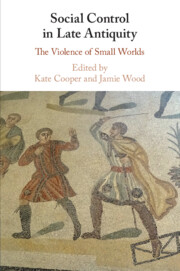Book contents
- Social Control in Late Antiquity
- Social Control in Late Antiquity
- Copyright page
- Contents
- Contributors
- Preface and Acknowledgements
- Abbreviations
- Introduction
- Part I Women and Children First
- Part II ‘Slaves, be subject to your masters’
- Part III Knowledge, Power, and Symbolic Violence
- Chapter 8 John Chrysostom and the Strategic Use of Fear
- Chapter 9 The Fear of Belonging
- Chapter 10 Words at War
- Chapter 11 Of Sojourners and Soldiers
- Chapter 12 Coercing the Catechists
- Part IV Vulnerability and Power
- Bibliography
- Index
Chapter 10 - Words at War
Textual Violence in Eusebius of Caesarea
from Part III - Knowledge, Power, and Symbolic Violence
Published online by Cambridge University Press: 18 September 2020
- Social Control in Late Antiquity
- Social Control in Late Antiquity
- Copyright page
- Contents
- Contributors
- Preface and Acknowledgements
- Abbreviations
- Introduction
- Part I Women and Children First
- Part II ‘Slaves, be subject to your masters’
- Part III Knowledge, Power, and Symbolic Violence
- Chapter 8 John Chrysostom and the Strategic Use of Fear
- Chapter 9 The Fear of Belonging
- Chapter 10 Words at War
- Chapter 11 Of Sojourners and Soldiers
- Chapter 12 Coercing the Catechists
- Part IV Vulnerability and Power
- Bibliography
- Index
Summary
This study seeks to analyse Eusebius’ Praeparatio Evangelica in terms of a fourfold taxonomy of modes textual violence: the relationship of the text’s composition to historical acts of violence, its narration of acts of violence, its adoption of violent language for otherwise not (necessarily) violent actions or practices, and its violence against the integrity of its opponents’ identities, thought, and writings. While the first two modes are more limited, the latter two modes of textual violence are exquisitely expressed – and yet simultaneously deeply complicated – by Eusebius’ apologetic work. De Certeau’s notion of a tactics of textual poaching, in particular, prompts a cautious reconsideration of how quotation of one’s opponents might (or might not) work as a mode of textual violence.
- Type
- Chapter
- Information
- Social Control in Late AntiquityThe Violence of Small Worlds, pp. 213 - 231Publisher: Cambridge University PressPrint publication year: 2020

